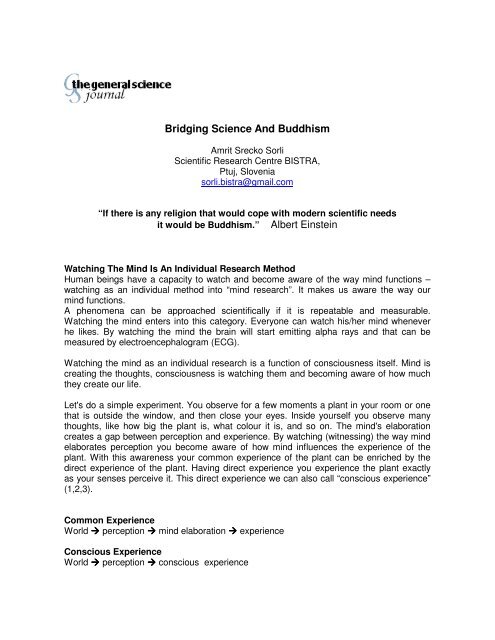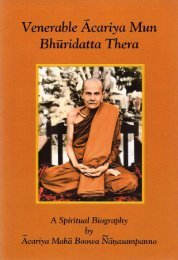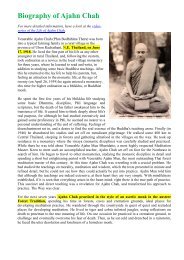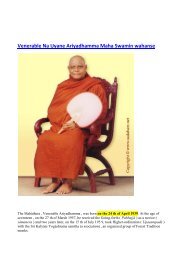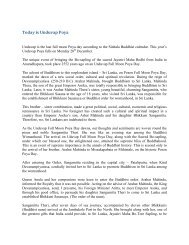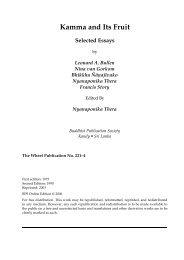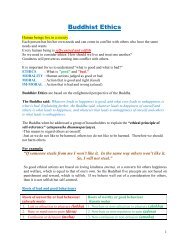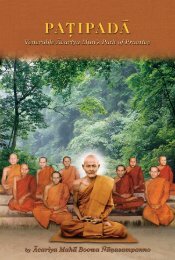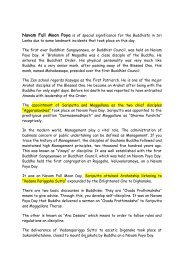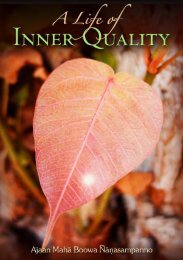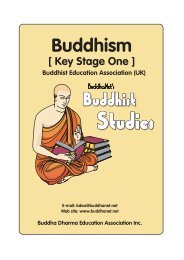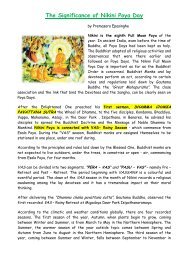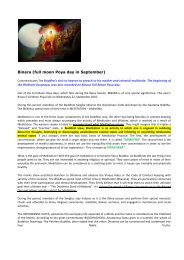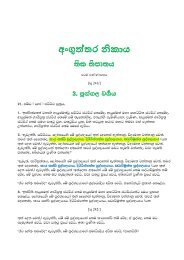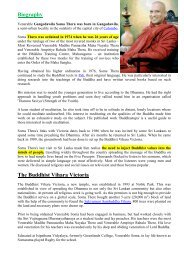Bridging Science And Buddhism Albert Einstein - The General ...
Bridging Science And Buddhism Albert Einstein - The General ...
Bridging Science And Buddhism Albert Einstein - The General ...
Create successful ePaper yourself
Turn your PDF publications into a flip-book with our unique Google optimized e-Paper software.
<strong>Bridging</strong> <strong>Science</strong> <strong>And</strong> <strong>Buddhism</strong><br />
Amrit Srecko Sorli<br />
Scientific Research Centre BISTRA,<br />
Ptuj, Slovenia<br />
sorli.bistra@gmail.com<br />
“If there is any religion that would cope with modern scientific needs<br />
it would be <strong>Buddhism</strong>.” <strong>Albert</strong> <strong>Einstein</strong><br />
Watching <strong>The</strong> Mind Is An Individual Research Method<br />
Human beings have a capacity to watch and become aware of the way mind functions –<br />
watching as an individual method into “mind research”. It makes us aware the way our<br />
mind functions.<br />
A phenomena can be approached scientifically if it is repeatable and measurable.<br />
Watching the mind enters into this category. Everyone can watch his/her mind whenever<br />
he likes. By watching the mind the brain will start emitting alpha rays and that can be<br />
measured by electroencephalogram (ECG).<br />
Watching the mind as an individual research is a function of consciousness itself. Mind is<br />
creating the thoughts, consciousness is watching them and becoming aware of how much<br />
they create our life.<br />
Let's do a simple experiment. You observe for a few moments a plant in your room or one<br />
that is outside the window, and then close your eyes. Inside yourself you observe many<br />
thoughts, like how big the plant is, what colour it is, and so on. <strong>The</strong> mind's elaboration<br />
creates a gap between perception and experience. By watching (witnessing) the way mind<br />
elaborates perception you become aware of how mind influences the experience of the<br />
plant. With this awareness your common experience of the plant can be enriched by the<br />
direct experience of the plant. Having direct experience you experience the plant exactly<br />
as your senses perceive it. This direct experience we can also call “conscious experience”<br />
(1,2,3).<br />
Common Experience<br />
World perception mind elaboration experience<br />
Conscious Experience<br />
World perception conscious experience
We can compare the human mind with an optical prism which bends the horizontal ray of<br />
light (see the picture below). We can compare a horizontal ray of light with the information<br />
that reach into our senses. This "horizontal information" is authentic information of reality.<br />
It is first elaborated by the mind and after experience occurs.<br />
Elaboration of the mind creates an "elaboration gap" between authentic and experienced<br />
information. By passing the "mind prism" the "horizontal information " changes direction.<br />
We do not experience the information as it has entered into senses.<br />
perception (senses)<br />
mind elaboration<br />
conscious experience<br />
information gap<br />
common experience<br />
Consciousness has the capacity to watch and to become aware the way mind elaborates<br />
information. It brings awareness that also "scientific picture of the world" and the world<br />
itself are two different things. Scientific picture of the world is rational, a scientist<br />
experiences the world through his/her rational mind, conscious experience of the world is<br />
deeper than rational, one experience the world as it is without adding his/her questions<br />
and searching for the answers. Werner Heisenberg commented that beautifully: “What we<br />
observe is not nature itself, but nature exposed to our method of questioning”.<br />
In meditation we experience reality directly. Meditative experience is real, it is closer to the<br />
reality as a scientific experience.<br />
Physical Basis of Consciousness<br />
Research of Penrose and Hameroff considers consciousness as a result of the quantum<br />
gravity acting on the mass of neurons inside of the brain. Consciousness is not only a<br />
result of the biochemical processes of the brain, it is deeply related to the cosmic space<br />
(4,5).<br />
According to the research of our group in the universe there is no difference between<br />
matter and consciousness. Both are two aspects of one energy that appears as two basic<br />
phenomena: as matter and as cosmic space. In the universe there is a continuous flow of<br />
energy “space - matter - space - matter” In black holes matter transform back into space,<br />
in explosions in the centre of the galaxies space transforms back into matter. Cosmic<br />
space is build up out of "basic packets of energy" called "quanta of space". Consciousness<br />
is a “basic vibration” of quanta of space. One could say that consciousness is a basic<br />
vibration of the cosmic space.
Conscious Observer<br />
“Observer” is a consistent part of a scientific experiment. As observer observes the<br />
experiment, he/she can also observe the mental process that describes the experiment. It<br />
is the same observer that is observing material world and the mind. <strong>The</strong> observer has also<br />
a possibility to observe himself. Having eyes closed and watching the mind observer<br />
becomes aware that he is not the mind, he is the space in which mind exists; observer<br />
discover its source that is consciousness itself. It is a consciousness that is observing the<br />
experiment through the person mind.<br />
senses<br />
mind consciousness<br />
experiment<br />
An observer that does not search inside is aware of the outside world only and unaware of<br />
the inner world. With turning his attention inside observer becomes aware that he is not<br />
the mind, but consciousness itself; discovering consciousness man become selfconscious,<br />
aware that his mind belongs to the education and society and his<br />
consciousness belongs the universe. He discovers his/her cosmic identity that is much<br />
deeper than his/her social identity. He/she enters into a deep intimacy with the entire<br />
universe. Going deeper into this "Oneness" with the universe one discovers the state of<br />
being that in the East is called “enlightenment“.<br />
<strong>The</strong> Concept of A-Temporal Physical Space In Physics <strong>And</strong> <strong>The</strong> Concept of Sunyata<br />
in <strong>Buddhism</strong><br />
By watching the way the mind works into the process of scientific research a scientist will<br />
become aware that his mind creates the picture of the universe also. He will be able to<br />
distinguish between the models of the world created by the mind and the world itself. This<br />
distinction brings new insights into understanding of time, space and gravitation.<br />
Physical time we experience as duration of material change that run into physical space.<br />
Time is duration of material change, it is not that change run into time. With clocks we<br />
measure duration and numerical order of material change.<br />
In today science we experience stream of material change through the concept of linear<br />
time that exist only as a model of the mind. We do not live in time, we live in the A-<br />
Temporal physical space (ATPS). <strong>The</strong> grandmother, the daughter and the grandchildren<br />
are all born in the same A-Temporal physical space.<br />
Physical Past and Psychological Past<br />
Stream of material change that runs into a-temporal space is irreversible, one cannot<br />
return into physical past because it does not exist. Psychological time, known as “inner<br />
time” is reversible, one can go back into his memory.<br />
According to Buccheri and Saniga in meditation and in alternate state of consciousness<br />
there is difference between the speed of the outer time (speed of material change) and the<br />
speed of the inner time; in meditation inner time stops and outer time still runs (6).
According to our understanding interpretation of Saniga and Buccheri needs some<br />
preciseness. In meditation one discovers ATPS, he experiences stream of material change<br />
exactly as it runs in the universe: the discovery of ATPS gives the sensation that time has<br />
stopped, that all runs into “eternal here and now”. This “timeless” experience is reflecting<br />
the real nature of the material change: an irreversible process that runs into a-temporal<br />
cosmic space. It is right what say Saniga and Buccheri regarding the fact that in meditation<br />
inner time stops: one reaches beyond the linear concept of time. But when they say that<br />
outer time still runs, it is important to understand that material change run in a-temporal<br />
space. In a way material change is running and not reaching anywhere. Material change is<br />
always running “here and now” in a-temporal space.<br />
Outer Space <strong>And</strong> Inner Space<br />
In a deep meditation we discover sunyata first inside of us as a infinite pool of a silent<br />
loving energy. Practicing meditation regularly one day we recognize that there is no<br />
difference between “inner space” and “outer space”. Sunyata exists inside and outside of<br />
us. Allan Wallace says: <strong>The</strong> distinction between external and internal is an illusion; internal<br />
and external space are ultimately non-dual. This is the absolute space of phenomena. In<br />
Buddhist literature, this is the Great perfection out of which the entire universe originates<br />
(7,8,9).<br />
By discovering sunyata you will transform your fear of death into compassion and deep<br />
understanding of life. We are born, we live and we die in the same “sunyata” you can call it<br />
“universal soul”, “ether” “God”. Name is not important, we have to discover it directly.<br />
Moses, Buddha, Jesus, Mohamed, Krishna, Osho and others has all discovered the same<br />
God. <strong>The</strong>y only call it with different names.<br />
A-Temporal Physical Space (Sunyata) Is <strong>The</strong> Origin of the Universe, of Life <strong>And</strong> of<br />
Consciousness<br />
Research of our team considers universe is a self-renewing system. Matter and space are<br />
in a permanent dynamic equilibrium without a beginning and without an end. Matter is<br />
continuously transforming into ATPS – sunyata in black holes. In a huge explosions in the<br />
centre of galaxies space is transforming back fresh matter into the centres of the galaxies<br />
(10).<br />
Evolution of life, of the human civilization is an integral part of cosmic dynamics that<br />
develops towards discovery of cosmic consciousness. Consciousness is a basic<br />
frequency of quanta of space that build up cosmic space and is a driving force of the<br />
evolution of life and of conscious species. All over the universe matter has a tendency to<br />
develop into life and further on into conscious species (11).<br />
Universe is a conscious and intelligent phenomena. Man is the result of cosmic dynamics,<br />
is the creation of the universe itself. As he do not understand that, man has invented the<br />
God which should create the universe and man itself. But opposite is truth; universe has<br />
created the man and the man has created the God.<br />
Man’s growth beyond the mind towards cosmic consciousness is required by the evolution<br />
itself, we have no choice. Hankering on the mind creates a danger of self-destruction. To<br />
come out of the chaos we living into we have to grow beyond the mind into cosmic
consciousness. History and current situation in the world show that human mind has no<br />
capacity to bring peace and harmony. Consciousness has it. Tibet before the Chinese<br />
occupation was a living example of a conscious society.<br />
By discovering cosmic consciousness inside of you your mind can only create things that<br />
support life and growth of the human being. Consciousness is a natural protection against<br />
destruction.<br />
We have to distinguish between “cosmic consciousness” and “human consciousness”.<br />
Cosmic consciousness is a basic frequency of cosmic space, human consciousness is the<br />
result of the “synchronization” of the neurons of the brain with cosmic consciousness. <strong>The</strong><br />
better synchronization, more conscious will be the person. When a person is totally “lost”<br />
into the mind his “conscience” is lost, his contact with cosmic consciousness is lost. He<br />
somehow becomes “potential mad”. He can be easily manipulated by the danger ideas of<br />
nationalism, racism, religious extremism. He has lost his “universal identity”, his “soul”, his<br />
“real nature”.<br />
Conscious Communication<br />
Mind belongs to the brain, consciousness belongs to the cosmic space. <strong>The</strong>re is the same<br />
consciousness watching the mind of a person in America and person in Europe.<br />
Consciousness as a direct information channel opens a possibility for a “Conscious<br />
Communication”. Two or more persons belonging to different cultures and religions can<br />
communicate direct without mind interfering.<br />
A man’s communication has two directions: outer (communication with others) and inner<br />
(communication with him/her self). <strong>The</strong> quality of outer communication depends on the<br />
quality of inner communication. Clearer is communication with ourselves, clearer is<br />
communication with others.<br />
inner communication<br />
inner communication<br />
auter<br />
communication<br />
person A<br />
person B<br />
One can communicate with him/her self and with others by the mind and by the<br />
consciousness. By the “mind communication” the information that we receive from the<br />
other person is first perceived by the senses, later on elaborated by the mind and finally<br />
experience occurs. Experience through the mind is indirect. Between elaboration and<br />
experience there is an information gap caused by the elaboration of the mind. Mind<br />
communication between person A and person B is indirect.
MIND COMMUNICATION<br />
person A<br />
mind<br />
senses<br />
senses<br />
mind<br />
person B<br />
mind elaboration creates an information gap between person A and person B<br />
As we say before consciousness has a capacity to watch and to become aware the way<br />
mind elaborates the information of the world that enter into senses. "Conscious<br />
communication" is direct, synthetic and free of emotions. One experiences other person<br />
directly without elaboration of the mind. Between person A and person B there is no<br />
information gap.<br />
CONSCIOUS COMMUNICATION<br />
person A<br />
senses<br />
senses<br />
person B<br />
there is no mind elaboration, information between person A and person B is direct<br />
By knowing only mind communication it is difficult to find solutions in the conflict situations.<br />
<strong>The</strong>re is no a “ground” communication that could help to experience a given situation<br />
similarly. Person A and Person B are far away from each other.<br />
Conscious communication between person A and person B is a “ground” communication”.<br />
Person A and B understand each other without speaking. <strong>The</strong>y communicate on the level<br />
that is beyond the mind. With development of conscious communication it is easy to find<br />
solution on the level of mental communication in different areas of human life: in the family,<br />
in business, in politics. Person A and Person B becomes both aware of their “mind
diversity”. <strong>The</strong>y recognize mind communication as secondary and conscious<br />
communication as primary. It is easy to find solutions on the “mental level”.<br />
Meditation – <strong>The</strong> Only Way To Peace<br />
In meditation you can go back through the whole evolution of life that exists as a memory<br />
in a collective unconscious mind. It is there you will discover your animalistic aggression<br />
and fear of being attached. On the planet man is still behaving as an animal in the jungle.<br />
We are acting out our unconscious mind. Meditation is the only way to go beyond the past,<br />
to find a spirit of harmony with the nature and with the other human being (12).<br />
<strong>The</strong> chaos we are living into on this planet today is the result of unconscious projecting of<br />
our thoughts into life. All that exist was first imagined by the mind and then realised into<br />
our life. We experience our life through the mind and we are not aware of how much our<br />
unconscious mind influences our experience and creates our life situation.<br />
Human mind that is full of prejudices, religious extremism, nationalism and racism creates<br />
a big “information gap”. <strong>The</strong>re is no communication possible between different cultures<br />
and religions. By accepting meditation as an individual research science will have an<br />
useful instrument for overcoming religious and cultural conditioning that are dividing today<br />
human civilization. We need a scientific education on the planetary level that will include<br />
meditation as its consistent part. Such an education will grow individuals free of any<br />
religious and cultural extremism, routed into sunyata, that is man’s cosmic identity, its “real<br />
face”. Meditation brings inner transformation that is the only way to peace and harmony.<br />
Lama Geshe Gedun Tharchin says on that subject: “Ultimately, establishing peace and<br />
security on our planet relies on an inner transformation within the lives of individuals. As<br />
the UNESCO constitution states, “Since wars begin in the minds of men, it is in the minds<br />
of men that the defences of peace must be constructed.’’ A sense of responsibility, to seek<br />
to develop our potential for creating positive action in the society is the personal<br />
enrichment and beginning of the broader transformation of the planet “ (13).<br />
Meditation Is A Source Of Creativity In <strong>Science</strong> <strong>And</strong> Art<br />
<strong>Albert</strong> <strong>Einstein</strong> says: “<strong>The</strong> most beautiful thing we can experience is the mysterious. It is<br />
the source of all true art and all science. He to whom this emotion is a stranger, who can<br />
no longer pause to wonder and stand rapt in awe, is as good as dead: his eyes are<br />
closed.”<br />
Into meditation we reach into the mystical dimension of the universe, into its “real nature”<br />
that is also the real nature of the human being. We become one with the whole universe.<br />
This “Oneness” is the source of creativity in science and art.<br />
Sources:<br />
1. Osho. (1989). Meditation: <strong>The</strong> First <strong>And</strong> Last Freedom, Neo Sannyas International<br />
2. Sorli. A, Sorli I. (2004). Lo Sviluppo Scientifico Di Consapevolezza,<br />
http://www.ecquologia.it/sito/pag756.map
3. Sorli A. Sorli I. K. (2004). <strong>The</strong> Scientific Basis For <strong>The</strong> Development Of Human<br />
Consciousness. Episteme, Perrugia, Italy, Number 8,<br />
http://www.dipmat.unipg.it/~bartocci/ep8/ep8-sorli2.htm<br />
4. Penrose R. (1994). 'Shadows of the Mind' (Oxford), 377-391.<br />
5. Hameroff S. (1994). 'Quantum Coherence in Microtubules: A Neural Basis for Emergent<br />
Consciousness' Journal of Consciousness Studies 1 (1), 91-118.<br />
6. Sorli A. Sorli I. (2005). Consciousness As A Research Tool Into Space <strong>And</strong> Time,<br />
Electronic Journal of <strong>The</strong>oretical Physics, Vol 2, Num 6 www.ejtp.com<br />
7. Sorl A. Sorli I. (2005) From Space-time to A-Temporal Physical Space, Frontier<br />
Perspectives, Vol 14, Num 1<br />
8. Sorli A., Sorli I. (2005). A-Temporal Gravitation <strong>And</strong> Hypothetical Gravitational waves<br />
Electronic Journal of <strong>The</strong>oretical Physics, Vol 2, Num 5 www.ejtp.com<br />
9. Buccheri R. , Saniga M. (2001), Endo-Physical Paradigm <strong>And</strong> Mathematics of<br />
Subjective Time, Frontier Perspectives, Vol 12, Num 1<br />
10. Alan Wallace (2001), <strong>The</strong> Potential of Emptiness: Vacuum States in Physics and<br />
Consciousness, <strong>The</strong> Scientific and Medical Network Review, No 77<br />
11. Sorli A., Sorli I. (2005). Evolution As A Universal Process<br />
Frontier Perspectives, Philadelphia, Vol 13, Num 2<br />
12. Osho (1975). I’m <strong>The</strong> Gate Rajneesh Foundation,<br />
13. Lama Geshe Gedun Tharchin (2005), Humanity, Religion and Peace in 21 st. century,<br />
Conference in Rome: “L’emergenza terrorismo ed i pericoli alla pace nel mondo: una<br />
nuova visione e le strategie possibili”, Sala del Cenacolo del Parlamento in Roma, 11th of<br />
November


